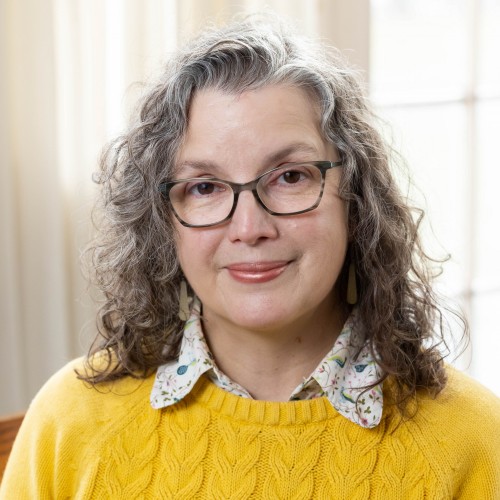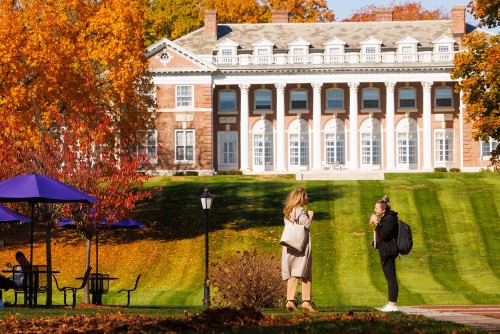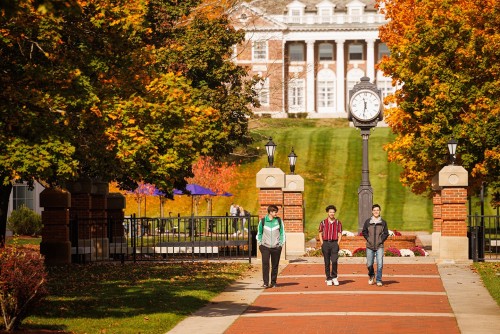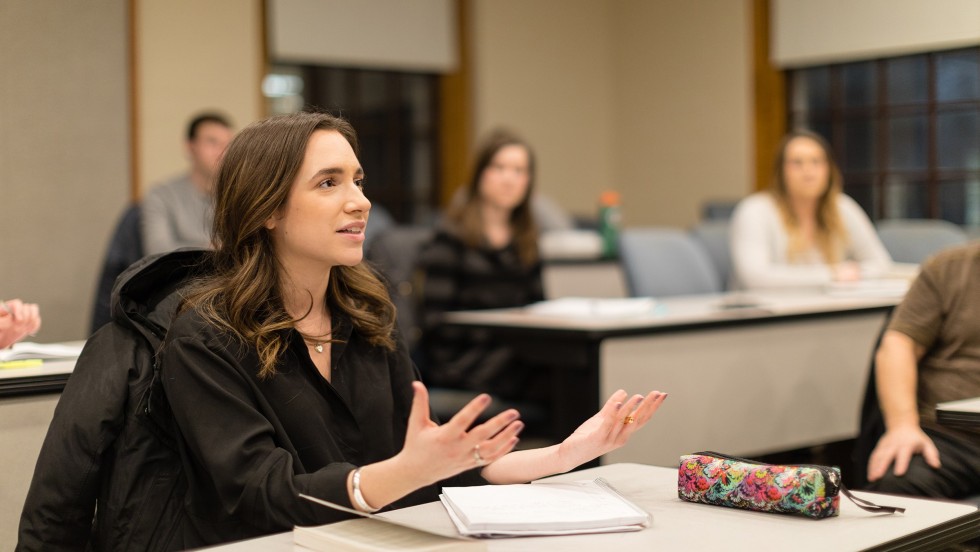Anthropology Major & Minor
The Anthropology program at Stonehill focuses on the holistic study and understanding of other cultures from an insider’s point of view and explores the diverse ways in which human beings perceive and order the social world.
Leveraging the sciences of human behavior
Stonehill’s exceptional programs in criminology, sociology and anthropology provide tools to thrive in a broad array of professions.
Program Overview
The Anthropology program, which centers on cultural and linguistic anthropology, gives students a competitive advantage in future pursuits by affording unique insight on the many factors that determine who we are and influence how we live.
Stonehill College’s focus on cultural anthropology helps students gain the skills to understand and appreciate human culture, and to study how people understand, organize, preserve and transform their social worlds. The theoretical lens and methodologies of anthropology center around dialogues with populations of concern, taking their culture into account and respecting their human and cultural rights.
The program aims to enhance students’ ability to thrive in an increasingly interconnected and globalized world by offering them an important critical framework for assessing the needs and appreciating the values and interests of diverse communities.
Interdisciplinary in nature, anthropology complements several programs at the College, including international business, healthcare administration, political science, arts administration, environmental studies and history.
Outcomes
Stonehill students have gone on to study anthropology at the graduate level, complete postgraduate service, including in the Peace Corps and Stonehill Service Corps, and begin careers in areas that include education, social work, travel consultation and business.
Fields that fit well with an anthropology degree include:
- Museum work
- International NGOs and development work
- Diplomatic corps
- Healthcare
- Non-profits
- Education
- Business
The skills I learned in the Anthropology program at Stonehill have helped me to understand humans in a more complex way, which will help me to accommodate and understand the diverse people I will encounter in any profession.
Sample Courses
Museum Studies
Illness and Society
Anthropology of Violence
Study Abroad Opportunities
The anthropology faculty encourages students who have the desire, the academic skills and the opportunity to avail themselves of the College’s established international programs.
Places where past anthropology students have studied abroad include:
- Beijing Center, Beijing, China
- Université Stendhal, Grenoble, France
- City Year, Athens, Greece
- National University, Maynooth, Ireland
- Universidad Pablo de Olavide, Seville, Spain
The anthropology faculty has available information on a wide variety of anthropology programs and internship possibilities located abroad. Students are encouraged to meet with the program chair for more information.
Research Opportunities
Anthropology students primarily use ethnographic research as cultural anthropology is qualitative, and its literature grounded in fieldwork.
Students’ coursework is informed by anthropological theory, ethnographic and archaeological research.
Stonehill Undergraduate Research Experience (SURE)
The Stonehill Undergraduate Research Experience (SURE) is an opportunity for students who have completed their first year at Stonehill to perform full-time, high-quality research over the summer months under the guidance of an expert faculty researcher. A student in the SURE program spends eight-10 weeks of the summer collaborating with a professor – and sometimes other students – on an original research project that fits into the faculty member’s overall research program.
The experience includes postgraduate career seminars, program-wide outings, weekly lunches and a student poster session in the fall. SURE students generally live on campus and receive a stipend for their summer work.
Allison Walsh, left, and Genny Dockrey working with ground penetrating radar (GPR) at the Butts Hill Fort research site in Portsmouth, Rhode Island.
SURE and Summer Field Schools
Anthropology Professor Alexandra Uhl, a biological archaeologist, has begun offering summer field schools at Stonehill, giving students the opportunity to apply principles of archaeology acquired in the classroom to research sites in New England.
Most recently students conducted research at Butts Hill Fort in Portsmouth, Rhode Island. Students learned how to use ground penetrating radar (GPR), metal detection, photogrammetry, 3D scanning, and mapping field methodology to document the site. Some of these students continue to work with Uhl to analyze GPR data and create visual reconstructions of buildings on the site, do 3D scanning and cultural preservation of archaeological assemblages through digitalization. One of their goals is to create a public database with these scans and coordinate with local museums to safely digitally preserve, clean and catalogue, and identify and interpret the artifacts.
Students have also worked with Uhl on the Historic Newport Spring Project, helping to excavate the area surrounding a freshwater spring on Touro Street in Newport, Rhode Island, which was a resource utilized by the Narragansett Indians and then after 1630 was the site where the center of the European colonial settlement grew into the City of Newport.
Anthropology Professor Alexandra Uhl, left, stands at a SURE poster presentation with three of her Field School students (from left) Genny Dockrey, Lily Michel and Allison Walsh.
Recent SURE Anthropology Projects
Kamilia A. Drogosz ’12 worked with Erica Tucker, assistant professor of Anthropology, Sociology and Criminology, on a project titled “Exploring the Construction of Polish-American Identities.” They used ethnographic research methods to explore how Polish-Americans identify themselves with regard to their Polish heritage and how patterns of identification vary from one generation to the next.
Hannah Rosen ’12 worked with Professor Tucker on a project titled “La Famille Étrangère: Cultural Constructions of Frenchness and the Home Stay Experience.” The project was an anthropological study of the home-stay experience conducted with host families and students studying abroad in Grenoble, France.
Kelli Brodbreck ’14, a North Attleboro native and Sociology major at Stonehill, worked with Professor Tucker on “To Teach or Not Teach? A Cross-Cultural Examination of Museum Representations of Violence Designed to Educate Young Children.” Brodbreck and Tucker conducted an anthropological study of how Polish and American museums convey the facts and meaning of difficult historical incidents such as oppression, slavery and violence to young visitors.
Recent Accolades
Organizations involved in assessing U.S. colleges and universities continually cite Stonehill as being among the best in the nation when it comes to value, outcomes and a commitment to making the world a better place. See full list of accolades.
-
U.S. News Ranks Stonehill in the Top 5% Nationally
After assessing U.S. colleges and universities based on 17 measures of academic quality and graduate outcomes, U.S. News & World Report ranked Stonehill No. 73 in the Best Value category out of 1,500 colleges, while also moving up to No. 83 among National Liberal Arts Colleges.
-
Wall Street Journal 2025 Rankings Place Stonehill Among Best Colleges in U.S.
Stonehill College has been recognized again this year by The Wall Street Journal for the value it provides students, especially in the areas of career preparation and character development.
-
Money Ranks Stonehill Among Best U.S. Colleges in 2024
Money’s 2024 Best U.S. Colleges research shows Stonehill among top 10% nationwide.
Outside Partnerships & Special Programs
Save Money: Earn Two Degrees in as Little as Four Years
Contact Information




